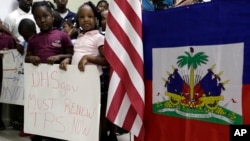The rate and extent of Haiti's recovery after a devastating earthquake is at the center of a trial in New York City that will determine if the Trump administration can end Temporary Protected Status (TPS) for Haitian nationals.
The case centers around the special status granted to roughly 50,000 people from Haiti to live and work in the U.S. temporarily after the earthquake in 2010. In addition, the Center for Migration Studies estimates that Haitian TPS holders have 27,000 children who were born on U.S. soil.
At the trial, being held in New York, the focus Wednesday was on emails between U.S. officials.
Migrant advocates have said the Trump administration was so eager to end the program that it chose to ignore reports from its own officials in Haiti that the Caribbean island was in no shape to accommodate the return of its citizens.
"The problem'' with that analysis, one Trump appointee to the Department of Homeland Security, Kathy Kovarik, wrote in an October 2017 email, "is that it reads as though we'd recommend an extension (of TPS) because we talk so much about how bad it is.''
"The basic problem is that it IS bad there,'' another official responded. "We can ... try to get more, and/or comb through the country conditions we have again looking for positive gems, but the conditions are what they are."
The nonjury trial is the first of seven cases filed in federal courts across the country to block the end of the TPS program, which has allowed about 300,000 people from Haiti, El Salvador, Nicaragua, Sudan and other countries to stay in the U.S. after their home countries were upended by natural disasters or violence.
In an interview with VOA last year, Haitian Ambassador to the U.S. Paul Altidor insisted the island had not recovered enough to handle the sudden influx. There are more than 50,000 Haitian TPS holders.
“The day after the earthquake … many friends and countries around the world got together to pledge and commit support to Haiti,” Altidor said. “Unfortunately, many of those pledges never came to fruition, so the resources that Haiti had relied on to actually rebuild itself, some of them didn’t come through, and some of them quite frankly got wasted."
Haiti suffered from a cholera epidemic in the earthquake’s wake, and in 2016, the country was hit by the strongest hurricane since 1964, causing widespread housing and food shortages and more than $2 billion in damage.
VOA's Ramon Taylor contributed to this report.





